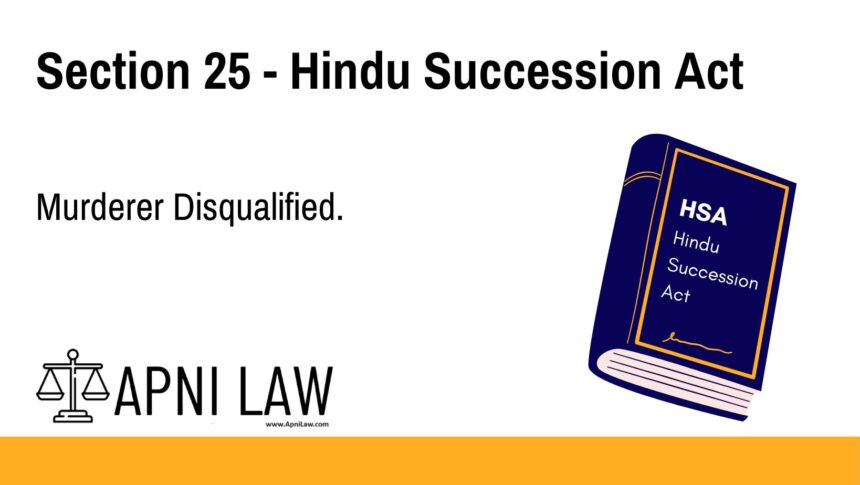Code: Section 25 – Murderer Disqualified
A person who commits murder or abets the commission of murder shall be disqualified from inheriting the property of the person murdered, or any other property in furtherance of the succession to which he or she committed or abetted the commission of the murder.
Explanation of Section 25 of the Hindu Succession Act
Section 25 of the Hindu Succession Act, 1956 introduces a vital principle of equity and justice: no person should benefit from their own wrongdoing. Specifically, it disqualifies a person from inheriting property if they have committed or abetted the murder of the deceased.
This provision ensures that a murderer or an abettor of murder is legally barred from receiving any share in the property of the victim. The rule is based on the maxim: “no one should profit by their own wrong.” This includes both direct perpetrators and those who assist or encourage the act.
The disqualification applies:
- To both movable and immovable property,
- When the act of murder is done with the intent of gaining a right to succession,
- Whether the accused is a legal heir or a nominee.
Illustration
Example 1: Son Murders Father
If a son kills his father with the intention of inheriting the father’s property, he is disqualified under Section 25. He cannot inherit any part of his father’s estate.
Example 2: Wife Abets Husband’s Murder
If a wife helps plan or encourages the murder of her husband to gain control over his property, she will also be disqualified from inheriting under this provision.
Common Questions and Answers on Section 25 Hindu Succession Act
1. What is the primary intent of Section 25?
The section is designed to prevent individuals from benefiting through criminal acts—particularly murder—when it relates to succession of property.
2. Does the disqualification apply to abettors as well?
Yes. Anyone who abets or assists in the murder is equally disqualified from inheriting under Section 25.
3. What happens to the disqualified person’s share?
The disqualified person is treated as if they predeceased the deceased. The property passes to the next eligible heir under the Hindu Succession Act.
4. Is a conviction necessary to invoke Section 25?
While the Act does not explicitly require a conviction, generally, a criminal conviction for murder or abetment under the Indian Penal Code is used to establish disqualification. However, in certain civil succession disputes, independent proof may suffice.
5. Does this apply only to Hindu families?
Yes. Section 25 is a part of the Hindu Succession Act and applies to Hindus, Buddhists, Jains, and Sikhs as per the Act’s scope.
Conclusion
Section 25 of the Hindu Succession Act plays a crucial role in maintaining the integrity of the succession process. By ensuring that no person can inherit property by committing or abetting a heinous act like murder, the law upholds the principle of justice and morality.
For more insights on succession law and property rights, visit ApniLaw — your go-to platform for clear and reliable legal content.








